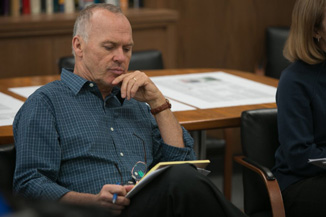|
|
Movie Review: SpotlightBy Ben GruchowNovember 27, 2015
Both of these, I’m fairly sure, are by design; although we get a few moments of unvarnished emotion (it’s mostly from the victims, with Michael Rezendes offering the most outwardly rattled persona), the movie mostly keeps us at arm’s length, refusing to provide an easy answer or an outlet through a scene or line of dialogue. It plays fair by doing this; the victims, after all, didn’t get absolution so easily (if they got it at all), and the individuals committing the abuse don’t obtain insight into themselves, or the proper therapy, for years if ever. This is perhaps the only way that Spotlight could get under the viewer’s skin once you get beyond the immediate storyline that everyone knows from the trailers; it does this skillfully, if not flawlessly. Ruffalo, Keaton, and McAdams are the only core cast members who really register consistently; d’Arcy James, Slattery, and Schreiber’s characters only really feel like they exist when they’re on-screen, and Billy Crudup as settlement attorney Eric MacLeish doesn’t get that. The movie ends with a true-to-life fact printed across the screen that plays as darkly humorous when you consider the nature of the Church bureaucracy as the film’s real adversary. Spotlight ultimately avoids a conclusion on where this sort of thing ends up, because it’s not really in the hands of any party that can be made to do the right thing.
|

|
|
|

|
Friday, November 1, 2024
© 2024 Box Office Prophets, a division of One Of Us, Inc.


